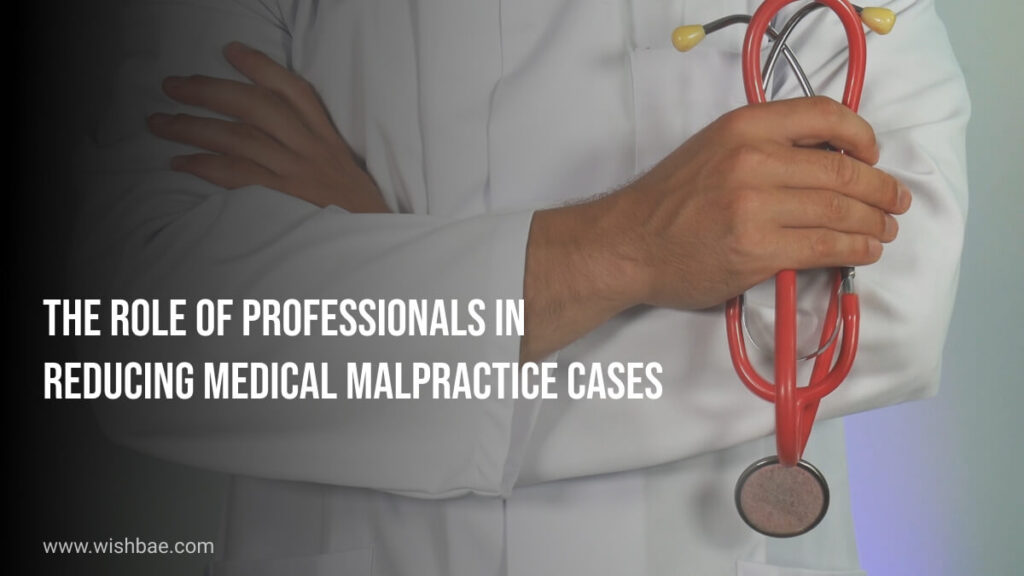Medical malpractice cases are a concern that transcends the boundaries of healthcare professionals alone. The collective efforts of medical and non-medical professionals, as well as healthcare institutions, are vital in preventing errors, enhancing patient safety, and ultimately reducing the occurrence of medical malpractice cases. This article will explore the significant responsibilities and contributions of professionals across various domains in mitigating the risk of medical malpractice.
1. Medical Professionals
a. Physicians
• Physicians are at the forefront of patient care, making their role in reducing medical malpractice cases crucial. They can contribute by:
• Staying Informed: keeping up with the latest medical advances, guidelines, and best practices to provide the most current and evidence-based care.
• Effective Communication: ensuring clear and open communication with patients, including discussing potential risks and benefits of treatment options.
•Timely Diagnosis: conducting thorough examinations, accurate diagnoses, and appropriate referrals when necessary to prevent diagnostic errors.
•Careful Documentation: maintaining accurate and comprehensive medical records to support clinical decisions and facilitate continuity of care.
b. Nurses
Nurses play a significant role in patient care and can help prevent malpractice by:
• Vigilance: monitoring patients closely and promptly reporting any changes in their condition to physicians or other healthcare providers.
• Patient Education: providing clear instructions to patients and their families regarding medications, procedures, and post-discharge care.
•Medication Administration: ensuring the correct administration of medications and verifying allergies or adverse reactions.
c. Pharmacists
Pharmacists are responsible for medication safety, and they can reduce malpractice risks by:
• Medication Review: thoroughly reviewing prescriptions for accuracy, potential interactions, and proper dosing.
• Patient Counseling: providing comprehensive information to patients about their medications, including potential side effects and interactions.
• Collaboration: communicating with healthcare teams to resolve any medication-related issues and optimize patient outcomes.
2. Non-Medical Professionals
a. Legal Professionals
Legal professionals, such as a medical negligence lawyer, play a vital role in holding healthcare providers accountable for negligence. Their actions include:
• Investigation: carefully examining cases to determine if there’s a valid claim of medical malpractice.
• Advocacy: representing patients who have been harmed due to medical malpractice and seeking compensation for damages.
• Public Awareness: raising awareness about medical malpractice and the rights of patients to encourage accountability within the healthcare system.
b. Healthcare Administrators
Administrators in healthcare institutions oversee operations and can contribute to reducing malpractice by:
• Quality Assurance: implementing quality assurance programs and policies to ensure that healthcare professionals adhere to best practices.
• Resource Allocation: allocating resources for training, equipment, and technologies that enhance patient safety.
• Risk Management: developing risk management strategies to identify and mitigate potential sources of malpractice.
c. Patient Advocates
Patient advocates serve as intermediaries between patients and healthcare providers, promoting patient rights and safety by:
• Education: educating patients about their rights, including informed consent and the right to seek a second opinion.
• Support: assisting patients in navigating the healthcare system, addressing their concerns, and facilitating communication with healthcare providers.
Conclusion
Medical malpractice cases are a complex issue that requires a collective effort from professionals across various domains. While medical professionals are responsible for delivering safe and effective care, non-medical professionals, such as legal experts, administrators, and patient advocates, also play critical roles in ensuring accountability and enhancing patient safety. By working together, professionals from diverse backgrounds can create a healthcare environment that prioritizes patient well-being, minimizes errors, and ultimately reduces the occurrence of medical malpractice cases. The collaboration of medical and non-medical professionals is instrumental in creating a healthcare system that patients can trust, knowing their safety and rights are upheld at all times.
You may also like:
TOP HEALTHY FOOD QUOTES TO INSPIRE HEALTHY EATING
BEST HEALTH IS WEALTH QUOTES TO INSPIRE YOU TO TAKE CARE OF YOURSELF.
MENTAL HEALTH AWARENESS QUOTES OF 2023 TO INSPIRE POSITIVE THOUGHTS








